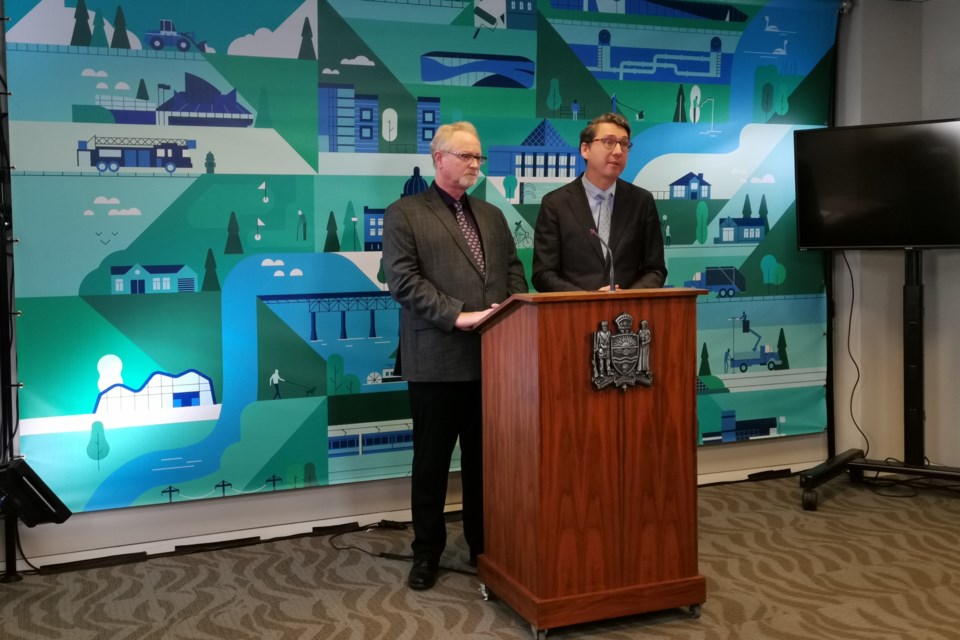Correction
An earlier version of this article stated St. Albert and Strathcona County would be the only municipalities uploading their entire transit systems to the proposed Regional Transit Services Commission. In fact, the business case accounts for all municipalities in the region that currently have transit systems uploading their entire systems, excluding Edmonton.
Travelling between up to 13 area municipalities using a single bus pass could be possible in as early as 2022, and is projected to cost St. Albert an average of just over $11 million annually.
On Wednesday, representatives from the Regional Transit Services Commission (RTSC) transition team shared their highly anticipated report on combining nine metro Edmonton area transit systems into one seamless regional transit system for 13 area municipalities.
Edmonton Coun. Michael Walters, co-chair of the RTSC, said public transit plays a critical role in realizing the “big vision” of attracting “young, educated entrepreneurs and professional people” to the metro Edmonton region.
“If we're really going to operate together as an effective region competing for that talent with other areas in the world, we need a really effective public transit system, not a high-five one where we have nine systems with buses passing each other on the same roads day after day,” he said.
“We can be a lot better and this report sets the table for us to do something really amazing."
Municipal councils in the region have already individually reviewed the RTSC report – called Accelerating Transit in the Edmonton Metropolitan Region – in camera and will each be making decisions in the coming weeks about whether to buy in or not.
St. Albert city council is set to make a decision during their Feb. 3 meeting.
Investigating a single regional transit system officially began in 2017, when Edmonton and St. Albert signed an agreement to begin taking steps to create a commission. The 11 other municipalities joined in 2018.
According to the report – created by Ernst & Young LLP – the commission’s work would begin in 2021 but rubber would not hit the road until 2022.
The business case accounts for all municipalities in the region that currently have transit systems uploading their entire systems to the commission, excluding Edmonton, which would begin with approximately 12 per cent of its routes.
Walters said after about five years a full entire upload of Edmonton Transit System’s (ETS) could occur. Financial projections for when ETS is 100 per cent accounted for are not included in the business case.When asked about implications for LRT development, Walters said it was not a main feature of commission discussions.
“It's not Edmonton's interest to get other municipalities to fund LRT; it's Edmonton's interest to build a regional transit network that increases transit ridership in the region, and increases labour mobility in the region,” he said.
St. Albert Coun. Wes Brodhead, who chaired the RTSC, said there are lots of “exciting things” that can be considered by a commission that are not being considered today.
“We need to get this up and running; we need to walk before we can run,” he said.
The commission would be operated by elected officials from each of the municipalities that sign on, however not each municipality would have equal voting power.
Walters said the commission’s voting structure would be a double majority, meaning votes would be weighed first based on population and ridership, and also a simple majority.
When asked if municipalities would have off-ramps to take their transit systems back later, Brodhead said he suspects "there’s always off-ramps.”
“You choose an off-ramp, though – the on-ramp back on is a little more difficult, to be sure,” he said. Walters later said municipalities would need to write a letter to the Minister of Transit.
Financial projections
Operations for the entire system would cost $402 million over seven years (2020 to 26) and on average would run an approximate $110,000 surplus. The commission would be in the red for the first four years, with the annual funding shortfall peaking in 2021 at $4.4 million. By 2026, operational savings of $3.4 million would be realized.
The price tag to St. Albert would be an annual average $11 million in requisition over five years, plus a base fee of $190,000. On average the city could realize annual savings of $81,000, the report says.
Capital requisitions were not accounted for in estimated municipal requisitions, the report said.
Brodhead said there would not be any long-term additional costs in providing transit through a commission.
"As a matter of fact, there's operational savings once it's all set up,” he said. The report noted currently 6,800 operational hours are spent in a week between the nine existing transit systems, and a commission could save an estimated 850 service hours per week.
The report says St. Albert would realize average annual savings of $81,000.
Daily transit rides in the region have increased by nearly 9,000 since 2015, the report said, while the number of automobile trips has increased by about 236,000.
While the commission is currently made up of all 13 members of the Edmonton Metropolitan Region Board, the commission is not affiliated with the board.
Municipalities included in the business case for a regional commission are: Beaumont, Devon, Edmonton, Fort Saskatchewan, Leduc, Leduc County, Morinville, Parkland County, St. Albert, Spruce Grove, Strathcona County, Stony Plain and Sturgeon County.




